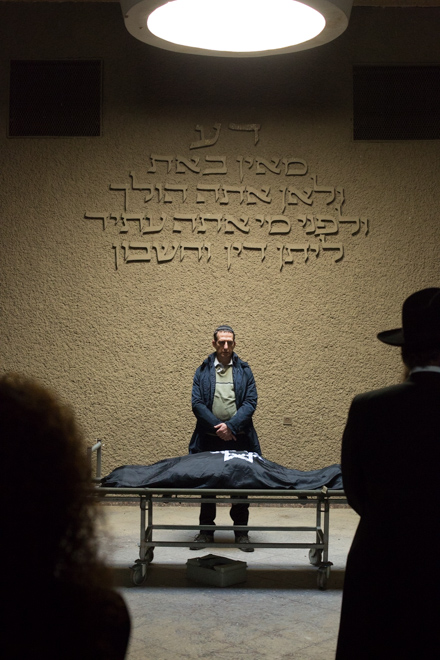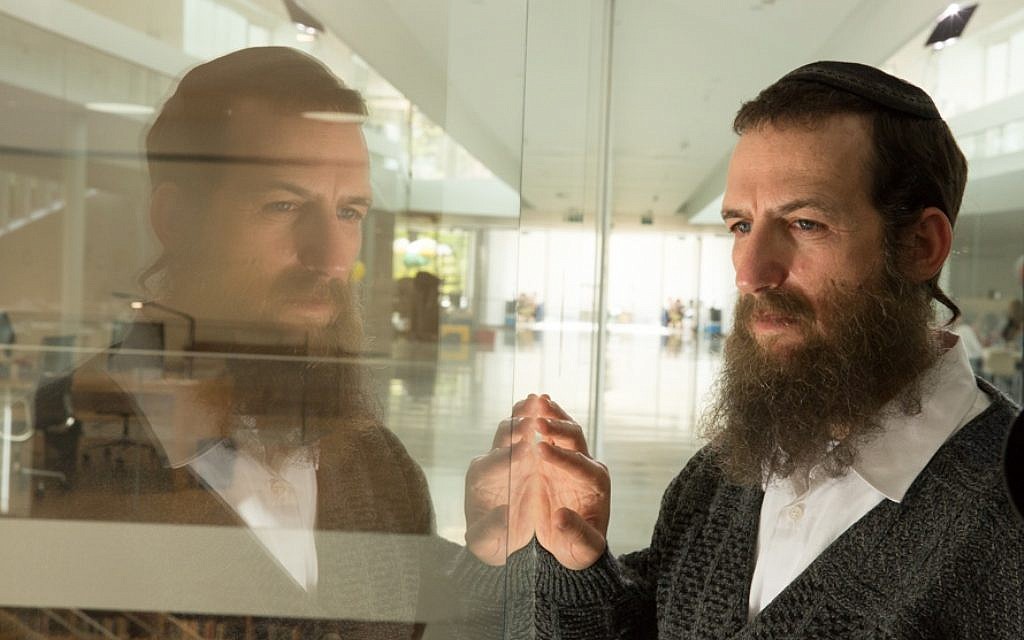NEW YORK — A title card before the start of “The Testament” states that it is “inspired by events that took place in the last days of WWII in Austria.”
As the film opens in Israel on January 11, we ask: Does that mean this is a true story? Partly a true story? If so, which part? And why does it matter?
It would matter a great deal to the movie’s protagonist, Yoel, the Orthodox historian who works for a state-sponsored Holocaust research organization.
The Austrian building’s sleek, modern interior with glistening white floors and flatscreen monitors belies where the bulk of Yoel’s work is done — a dimly-lit basement with old maps tacked to the wall, and a lock on the door resembling a cage.
We first meet Yoel as he is struggling with Austrian bureaucrats, stalling for time. There’s an Austrian plan to develop housing in the fictional town of Lensburg, but there is just enough evidence to suggest that a massacre of Jewish laborers took place there… somewhere.
Yoel is bent on locating the site and preserving its sanctity, but previous digs have failed to find the remains and the city is eager to “look to the future, not the past.”
A short extension is granted for Yoel to continue his research, and here’s where director Amichai Greenberg makes his first of many surprise moves.
Yoel’s team and the Austrians are not in the same room — they are conversing over computers. One needs to take a step back to see the whole picture.
His frenzied research leads him to something that splits his life – and this movie – in two. His Holocaust survivor mother once gave filmed testimony of her wartime recollections, which was meant to be kept in a secret file until after her death. Yoel suspects it won’t have relevance to his case, but he watches it anyway when he sees an inconsistency about her name.
Yoel has heard every horrible story of what people did to survive, but he never expected this. His mother is not Jewish. She was the abandoned daughter of a maid who worked in a Jewish household. She was raised alongside them, took part in their rituals, and when the Nazis came, she made no effort to distinguish herself. Many would consider this practicing, elderly woman as Jewish as they come, but Yoel’s whole life is driven by the pursuit of facts.

His rabbi says leave it alone. His sister says leave it alone. Do you think he leaves it alone? No, of course not, but here’s where first-time film director Greenberg adds another unexpected twist. You’ll need to see the movie for yourself to find out where it goes.
And you should see this movie. As a critic writing for The Times of Israel for over five years, I’ve seen a lot of movies focused on European cultures trying to bury their war crimes against Jewry. (I suggest taking a look at “Aftermath,” “1945” and, especially, “Ida,” which is one of the best five films of the 2010s.)
While some critics aren’t coming out and saying it, when another title like this hits the festival circuit there is a sense of “Oh, another one?” (The notices from the Venice Film Festival where “The Testament” debuted were somewhere between restrained praise to a shrugging dismissal.)
But something hit me during a scene in which Yoel gets frustrated and aggressive, pressing an elderly survivor too hard, asking her where precisely she stood in a field when she heard screams and gunshots 70 years ago.
Elsewhere in the film we see Yoel pushing his son to recite his Haftarah to perfection.

There’s a symmetry between the two moments. As the survivors age and pass away, are their stories blending with our religious texts? When does watching another movie about the topic cease being “Never Forget,” let alone entertainment, and become liturgy? And where are we more likely to find Yoel’s most treasured things in the world, “facts”?
I may sound a little over-dramatic, but for a film about a man hoping to acknowledge (avenge?) the souls of the forgotten just as his identity is taken from him, it’s hard not to be.
“The Testament” is that sort of big movie, and concludes with an extra layer of buried poignancy. No, you actually haven’t seen this story before.
Main Photo: Ori Pfeffer as Yoel in ‘The Testament.’ (Courtesy Gum Films)


























